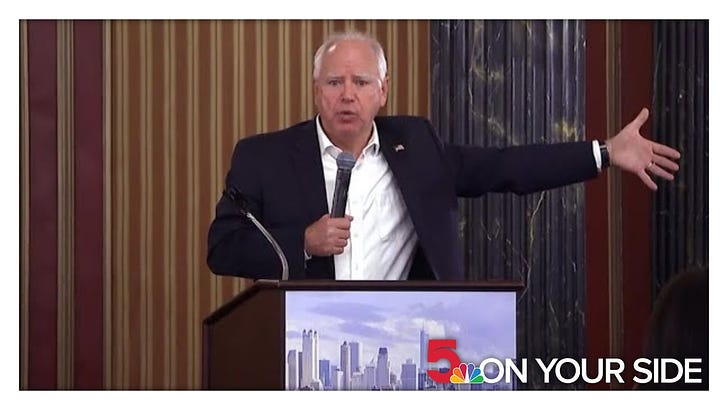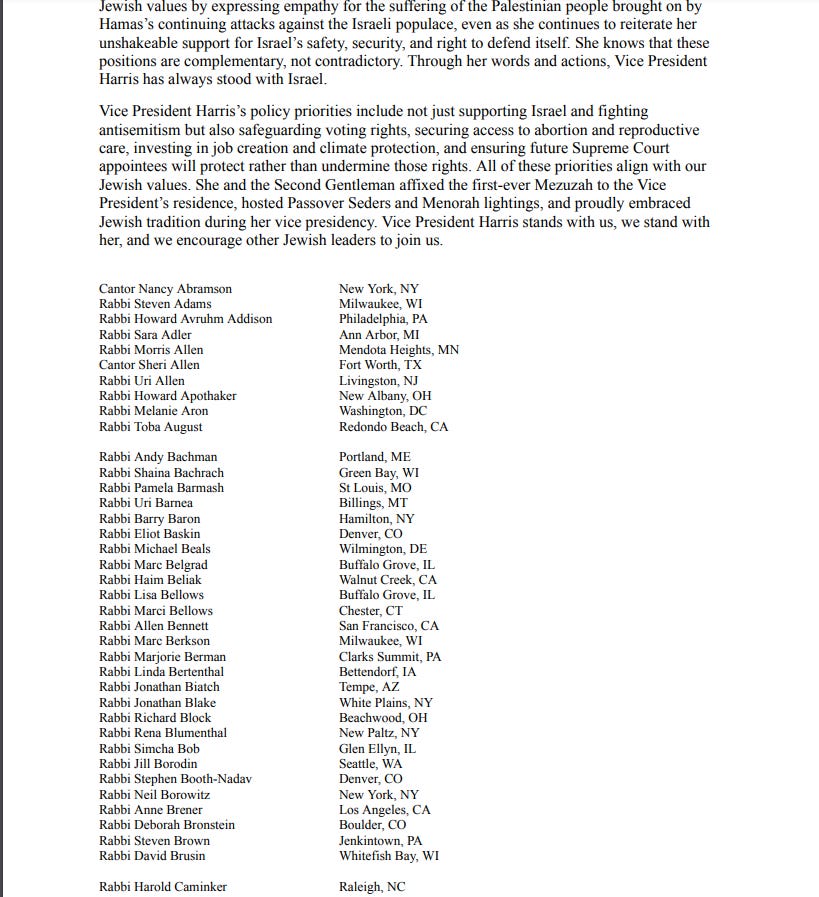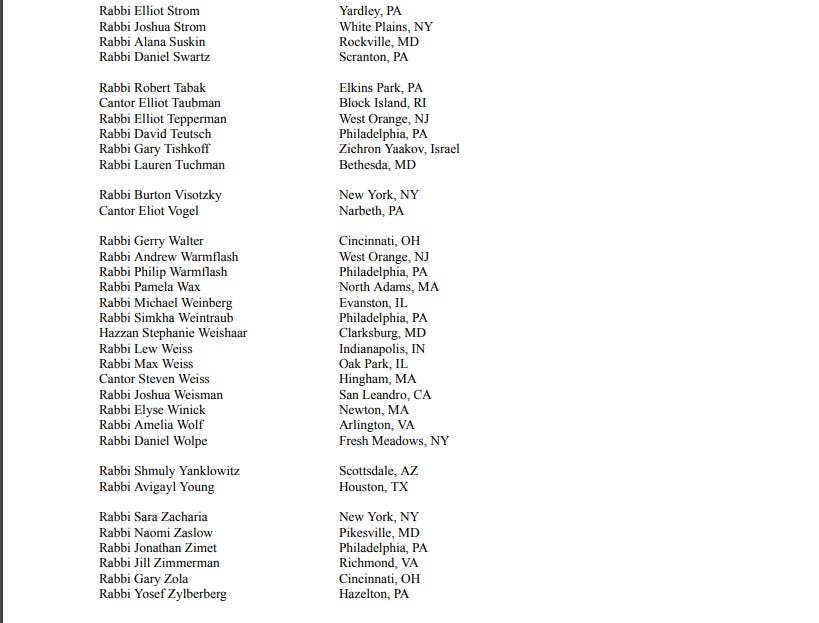The Fierce Urgency of "If Not Now"
The world is at an inflection point. We need MLK's "fierce urgency" combined with Hillel's "If not now, when?" But Hillel's dictum is telling us more than we realize.
Tim Walz likes to remind people of the the need to seize this moment and lay it all out on the field. “We’ll sleep when we’re dead,” he is fond of saying.
And, I might add, if things don’t go well on November 5, we might be dead sooner than we think. Or at least our democracy might be, our freedoms might be, and the world as we know it will cease to exist. The American experiment could be over. Anyone who has been listening to the MAGA rhetoric and who has looked at Project 2025 can not help but think otherwise.
So, with votes already being cast by the millions, there is an extreme urgency to this moment, this “now,” to use the rallying cry coined by Martin Luther King, Jr., and further popularized by President Obama.
“We are now faced with the fact that tomorrow is today. We are confronted with the fierce urgency of now. In this unfolding conundrum of life and history, there "is" such a thing as being too late. This is no time for apathy or complacency. This is a time for vigorous and positive action.” - Martin Luther King Jr
2,000 years ago, the rabbinic sage Hillel spun a similar catchphrase that I believe captures the spirit of this moment even better:
“If not now, when?”
I look at this line in several ways that are most relevant at this moment.
First, echoing MLK, there is an urgency to this moment. We can not procrastinate any longer. If we were planning on making that call or donation, or writing that op-ed - and certainly of casting that vote - now is the time.
Second, the commentary on Hillel’s statement, from the 15th century Italian Jew, Ovadia from Bertenuro (called the Bartenura), reinforces the sentiments of Tim Walz. “If not now,” he says, “means: in this world.” It means, while we’re alive.
Although there are many traditions about an afterlife, known to the rabbis as “the world to come,” Judaism always places a premium on the actions we take in this life.
Psalm 115:17 states, “The dead will not worship You, nor any who go down into silence.”
Because this life is the only place where our actions will resonate, we must grab this moment to act. We may never get another chance to determine the nature of the world that will exist, God willing, long after we have gone. Once we have “gone down,” we will be unable to change anything. For the psalmist, “going down” means to the grave, the abode of the dead known in biblical times as She’ol.
But for us, “going down” could also signify a rapid decline to the ignominy of having twiddled away our democracy by not doing enough when we had the chance to do it. We would be “going down” in history as a generation of naive fools, suckered by a con man into giving away our birthright, numbed into submission by the never-ending carnival of distractions and manufactured outrage.
“Going down into silence” is precisely how I would describe things right now. Too many are capitulating. The media, religious leaders, business leaders, not to mention many politicians. Everyone who is silent is complicit right now, including some of my Jewish clergy colleagues. “Going down into silence” is dragging all of us down.
Click here to see the letter of support for the Harris Walz ticket signed by hundreds of Jewish clergy, including me. Hundreds have signed, but there should be hundreds more. I’ve also cut-pasted it at the bottom. For those whose names aren’t there - those who understand the urgency of this moment but just felt they could not sign - I can understand that it may not be politically expedient within your congregations for you to take a stand like this. Of course, your congregations can’t endorse a candidate. But clergy can still take moral stands when the need arises. This is a moral moment if there ever was one.
To my colleagues and other moral, political and thought leaders, I implore, in the manner of the psalmist: “The dead will not worship You, nor any who go down into silence.” In my mind that means: Those who bring our nation down with their silence now will have forfeited a precious chance to bring a measure of godliness and basic human decency back to our troubled world.
If we don’t do everything we can possibly do to prevent this fascist coup - and yes, Trumpism is a new American strain of fascism, as General Milly said explicitly, calling Trump “Fascist to the core” and freeing the rest of us to call it what it is - we will only have ourselves to blame. And so, “If not now, when?” means precisely now, while we have the physical life-force within us, and, for now, the freedom, to do something about it.
We should never take lightly the threat to violently deport tens of millions of people here legally, to use military forces on political opponents and to remove basic freedoms we’ve longed taken for granted.
We can sleep when we’re dead.
I have a third commentary on Hillel’s line that I’d like to share. “If not now, when?” means that we must be fully focused on the present, because if we allow ourselves to escape the perils of the moment - of the now - we are too susceptible to fall into the trap of seeking solace in the false narratives of nostalgia - of someone else’s idealized “when.”
Many who lived through 2020 have somehow been able to whitewash the horrific way President Trump handled the Covid crisis, laid waste to the economy and perpetrated a negligence that likely cost us hundreds of thousands of lives. Many also nostalgically reminisce about the “paradise” that they recall as 2017-2019. I know that for Jews, we saw a huge increase in hate, Nazis marching in the open and the first-ever massacre of American Jews at prayer in their synagogue. Hardly paradise.
I’m not here to argue about the moral, diplomatic and economic disaster that was the Trump presidency. That’s for experts to debate. What I’m here to say is that people forget the pain, in history as in childbirth, and create fictions in their mind. And Hillel is telling us to live not just for the moment, but in the moment. THIS moment.
If we forget the now - if we neglect to place our full focus on this moment - we are liable to succumb to the whims of the whens, the once-upon-a-times that our wounded minds and fractured souls invent.
One of the most confounding verses in the entire Torah is Exodus 16:3. The Israelites have just been freed from 400 years of slavery, literally less than three months before. And they are complaining to Moses and Aaron about their lack of creature comforts.
Things were sooo great in Egypt, weren’t they? They literally are talking about flesh-pots. This verse is where that hedonistic expression was invented. Granted, the people were hungry. Granted, their future was uncertain. They hadn’t reached Mount Sinai yet, so no Covenant. I get it.
But fleshpots? When they looked back at the whips and blood and children ripped from the arms of their parents and thrown into the Nile (rather than cages in Texas), in their mind’s eye they they saw the Moulin Rouge? They saw huge feasts? They had meat. They had fish. Gortons of Giza! Talk about nostalgia. When there is so much pain - and our pandemic was comparable to Egyptian slavery in scope - nostalgia is the best defense mechanism we have.
That’s how many feel now as well. People are having a hard time, even if the economy is objectively on the upswing. Candidates need to respond to their pain.
But it’s one thing to do that - to focus on the “now,” and it’s quite another to project an entirely fictitious gauzy glaze on a time that was not very good.
And look at the first few words of the verse. “If only we had died” in Egypt. Their nostalgia has become so extreme, so psychologically dominant, that it has become a death cult. They would prefer to die in the illusions of an imagined past that forge ahead through the unknown wilderness toward an as yet unrealized Promised Land.
“If not now, when?” means, then, that we must force ourselves, and our neighbors, to focus on what’s here and now, not the past, to squint directly into that blinding light, and then maybe a bit past it into the future. We need to put one foot in front of the other, suppressing the temptation to look back and to move our minds to the world of make-believe, an imagined past of Uber-mensches with Arnold Palmer genitalia, Norse gods in fast cars, racial purity in maternity wards, and Betty Crocker kitchens and Sunbeam suburbs with subservient women bringing their husbands their pipe and slippers. And no dark strangers eating the pets.
It’s time to dig our neighbors and ourselves out of the black pit of nostalgia and into the urgent immediacy of now.
If not now, when?
See my prior pieces in this series:
Jack Smith's Jan. 6 Brief - Six Takeaways from Jewish Sources
Greatest Hits from the Trump Era #1: Moving the Embassy to Jerusalem
Are Holocaust-era comparisons ever appropriate? Yes. Exhibit A: What he said Monday













